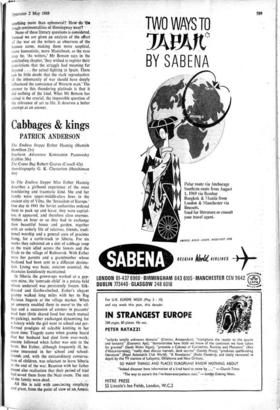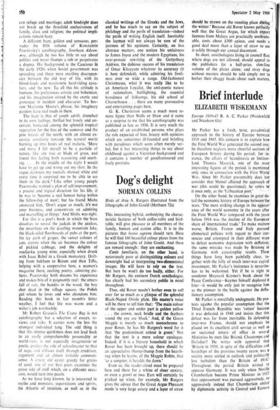Cabbages & kings
PATRICK ANDERSON
The Endless Steppe Esther Hautzig (Hamish Hamilton 21s) Southern Adventure Konstantin Paustovsky (Collins 30s) The Crane Bag Robert Graves (Cassell 42s) Autobiography G. K. Chesterton (Hutchinson 40s) • 1, In The Endless Steppe Miss Esther Hautzig describes a girlhood experience of the most bewildering and traumatic kind. She and her family were upper-middle-class Jews in the ancient city of Vilna, the 'Jerusalem of Europe.' One day in 1941 the Soviet authorities ordered them to pack up and leave; they were capital- ists,, it appeared, and therefore class enemies. Within an hour or so they had to exchange their beautiful house and garden, together with an orderly life of relatives, friends, tradi- tional worship and a general aura of gracitnis living, for a cattle-truck to Siberia. For six weeks they subsisted on a diet of cabbage soup as the train idled across the forests and the Urals to the village of Rubtsovsk. With Esther were her parents and a grandmother whose husband bad been sent to a different destina- tion. Living was basic, stoicism essential, the decencies fastidiously maintained.
In Siberia the grown-ups worked at a gyp- sum mine, the 'comrade child' in a potato field whose undersoil was persistently frozen. Silk- dressed and Garbo-cloched, Esther's elegant granny walked long miles with her to flog Parisian lingerie at the village market. When an amnesty enabled them to move to the vil- lage- and a succession of corners in peasants' mud huts (little shared food but much mutual nit-picking), mother exchanged dynamiting for a bakery while the girl went to school and per- formed prodigies of saleable knitting in her spare time. Tragedy came when granny heard that her husband had died from over-work; anxiety followed when• father was sent to the
front. But Esther, although frequently be- came. interested in her school and -school- friends and, with the extraordinary conserva- tism of children, was reluctant to leave Siberia at the end of the war. Reunion with her father meant also realisation that their period of trial had saved them from the Nazi ovens. The rest of the-family were dead.
All this is told with convincing simplicity and grace, from the point of view of an Ameri-
can refuge and marriage; adult hindsight does not break up the threefold exclusiveness of family, class and religion; the political impli- cations remain hazy.
A different haze, golden and sensuous, per- vades the fifth volume of Konstantin' Paustovsky's autobiography, Southern Adven-, Are, although he too has little to say about politics and never thumps a tub or perpetrates
a dogma. His background is the Caucasus in the early 1920s when Soviet government was spreading and there were .startling discrepan- cies between the old way of life, with its blood-feuds and narcissistic hard-riding cava- liers, and the new. To all this his attitude is humane, his preferences artistic and bohemian, and his imagination stirred by the exotic and grotesque in incident and character. To bor- row Marianne Moore's phrase, his imaginary gardens have real toads in them.
The haze is that of youth adrift, drenched in its own feelings, thrilled but lonely and un- certain, homesick among the splendid tropical vegetation for the hiss of the samovar and the pine forests of the north, with an almost ex- cessive sensitivity towards the natural world burning up into bouts of real malaria. 'More and more I felt myself to be a particle of nature, like any tree or blade of grass, and found this feeling both reassuring and sooth- ing. . . . In the middle of the night I would have to get up and wring out my shirt. In the vague darkness my toenails showed white and every time it surprised me to be able to see them in the dark' Like other young people Paustovsky wanted a plan of self-improvement, a precise and logical direction for his life, if he was to 'become a real human being within the fellowship of men'; but his friend Misha answered him, 'Don't argue so much, it's'not your business, and concentrate on admiring
and marvelling at things.' And Misha was right. For this is a poet's book in which. the haze dissolves to reveal the jackals in the azaleas,
the moorhens on the dazzling mountain lake, the black-oiled floorboards of pubs at the port, the icy gush of grapes, the sunset colours of jam, storms when the air becomes the colour
of pickled cabbage, and the delights of madjarka, young wine, especially when drunk
with Isaac Babel in a Greek monastery. Drift- ing from Sukhum to Batum and then Tiflis, helping with a cooperative here, a seamen's magazine there, reciting poetry, admiring pic- thres, Paustovsky both dreams his experience and makes bits of it poignantly real: the streets full of rats, the bandits in the wood, the boy shot dead in the village square, the Polish girl whom he loves and who abandons him.
Reading this book in last month's bitter weather, I feel that life was warm and a writer's job worthwhile.
Mr Robert Graves's The Crane Bag is not autobiography but a selection of essays, re-
views and Las. It carries none the less the strongest individual tang. The odd thing is that this intense quirkiness does not lead back
to an easily comprehensible personality or world-s iew, is not especially imaginative-or poetic, prefers the role of schoolmaster' to' that of sage, and diffuses itself through erudition, argument and an almost irritable common- sense. A crusty old oyster greedy for grains of sand, one of our best poets examines the prose side of stuff which, on a differdist occa- sion, would turn into pearls,
As we have long known, he is- interested in myths and monsters, superStitions and spirits, the Atlantis of intuition, as well -as in the
classical writings of the Greeks and the Jews, and he has much to say on the subject of philology and the perils of translation—indeed the perils of writing English itself. Inevitably the layman -will not always be sure of the justness of his opinions. Certainly, on less abstruse matters, one notices his unfairness to James Joyce and the modern Egyptians, his over-prosaic rewriting of the Gettysburg Address, the dubious success of his translation of Omar Khayyam whatever its accuracy (it is here defended), while admiring his liveli- ness over so wide a range. Old-fashioned Christmases, what it was really like to be an American Loyalist, the anti-poetic nature of rationalism, bullfighting, the essential bawdiness of folksongs, his old school of Charterhouse . . . there are many provocative and entertaining pages here.
G. K. Chesterton seems a much more re- mote figure than Wells or Shaw and it came as a surprise to me that his autobiography was published as late as 1936. It is very much the product of an established persona who plays the role expected of him, breezy with opinions which are sometimes ill-founded and bristling with paradoxes which seem often merely ver- bal, but it has interesting things to say about childhood against a Victorian background and it contains a number of goodhumoured and lively portraits.



































 Previous page
Previous page